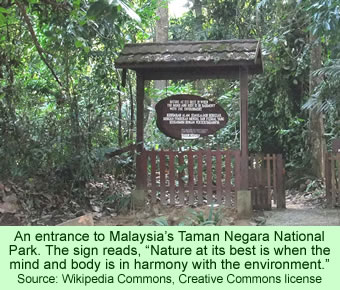A Malaysian newspaper published a series of three articles early last week analyzing the harm that rampaging logging is causing to the Batek people. They live on the fringes of the world famous Taman Negara National Park in northern Peninsular Malaysia, which also is being impacted by the lumbering activities. Using the Google translation service, the original Malay language stories can be easily understood.
 The first article said that the park, also called locally Kuala Koh National Park, has preserved more or less the same ecosystem for an estimated 130 million years. Furthermore, the park permits the indigenous Orang Asli people of the area, the Batek, to live in their communities and practice their traditional subsistence lifestyle.
The first article said that the park, also called locally Kuala Koh National Park, has preserved more or less the same ecosystem for an estimated 130 million years. Furthermore, the park permits the indigenous Orang Asli people of the area, the Batek, to live in their communities and practice their traditional subsistence lifestyle.
The park is visited by nature lovers from around the world who are attracted by the peace and the opportunities to see diverse flora and fauna. It is known to include 286 species of mammals, 479 bird species, more than 495 species of freshwater fish, and 51 species of herps—amphibians and reptiles.
According to the journalists, the two major rivers in the northern part of the park, the Koh River and the River Lebir, are increasingly threatened by pollution. The Deputy President of the Malaysian Nature Society, Dr. Ahmad Ismail, accompanied the journalists in their investigation of the situation in and around the park.
After a trip along a rough road toward the park entrance, they took a boat ride on the River Lebir. They saw clear evidence of felled trees and erosion of the river banks. The pilot of the boat, Zulkifli Mansor, told his passengers that the river turns cloudy like milky tea whenever it rains. This is a new phenomenon dating only from the logging of the last couple months, he said. He added that he was worried the lumbering would harm the park’s plants and animals.
A 30 minute boat ride led to a Batek village located only half a kilometer from a pile of logs. The Batek in this community, as a result of the logging, have lost their access to clear, unpolluted water. They were quite concerned also about the graves of their ancestors, which are threatened by the logging. The journalists detected tensions in the faces of members of the 70 families in the village.
The second report continues the story of the visit to the park and the Batek people. Evidently, the Batek now have to use water that has drained off nearby oil palm plantations for their cooking and bathing. They worry about toxic chemical fertilizers in the polluted water. They have to walk long distances to get even that, polluted as it is.
The village headman, Hamdan Keladi, 40, described the results of the situation. After two or three days of bathing in the polluted water, he said that his body tingles. He added, however, that as yet they had not had health problems or vomiting from using the water for cooking or drinking.
Hamden also said that the surrounding forest had already been surveyed for logging. He indicated that farmers who had settled in the areas already cleared of forests had not had much positive contact with the Batek. They did not ask permission for using their land. He told the visitors that the logging could destroy their community, since they had not been given any written titles to the land they live on.
Other residents told the visitors that the logging activities in the area had harmed agricultural crops. One person, named Board Majid, said that the logging had harmed the rubber plantations and other crops, such as cassava and vegetables. However, he did not explain how the logging had impacted those crops.
Penang Hassan, another Batek, told the visitors that the authorities should act to control the rampant logging.
The third news story focused on the desecration of Batek graves. Jamil Hendi, 21, discussed his feelings of grief one day at seeing a bulldozer parked on top the grave of his son. Four other nearby graves had also been desecrated by the machine, parked there by unfeeling settlers.
He went on to say that the outsiders did not consider the reactions of the Batek in such matters—they only thought of their own needs and interests. He felt that the Malays not only ruined the lives of the Batek with the logging, they crushed their spirits as well. In the words of the Google translation, he said “this activity must be stopped immediately, before the situation [worsens].”
Another man, Jais Yam, 40, echoed his sentiments. He had left the area in a fairly peaceful condition, he explained, but when he returned recently everything had changed for the worse.